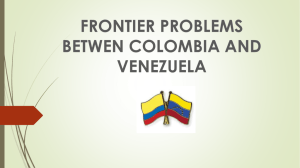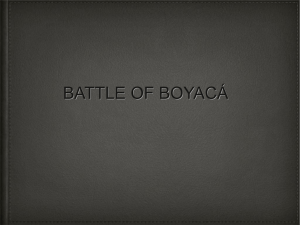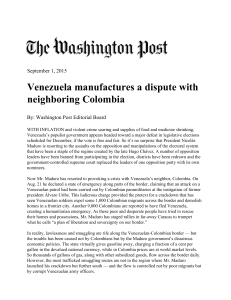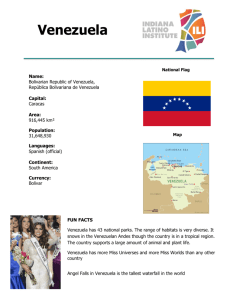Presentación de PowerPoint
advertisement
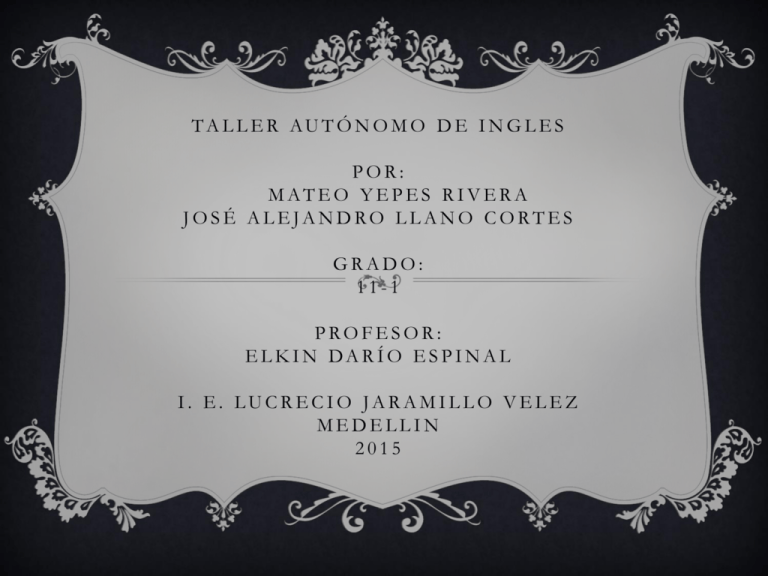
TA L L E R AU T Ó N O M O D E I N G L E S POR: MATEO YEPES RIVERA JOSÉ ALEJANDRO LLANO CORTES GRADO: 11-1 PROFESOR: E L K I N DA R Í O E S P I N A L I. E. LUCRECIO JARAMILLO VELEZ MEDELLIN 2015 BONDER CRISIS BETWEEN COLOMBIA AND VENEZUELA Since Monday, the Government of Colombia begins deploying its diplomatic offensive in multilateral scenarios for the international community to denounce the abuses and illtreatment of those who have been victimized Colombians deported by Venezuela. The first stop of this strategy first announced by President Juan Manuel Santos on Thursday, when he summoned the ambassador of Colombia in Venezuela, Ricardo Lozano will be the Permanent Council of the Organization of American States (OAS), which is said to today at 3pm. That instance, which have seat the ambassadors of 34 countries of the continent-including the United States, must approve the conduct of a meeting of foreign ministers, in which the diplomatic mess that cross Colombia and Venezuela will be addressed. On Thursday, the stage will be the meeting of foreign ministers of the Union of South American Nations (Unasur), which is expected to foreign ministers of the 12 countries in the region are. Although experts consulted by El Tiempo stated that it should not expect too many practical results of the citations in the OAS and Unasur, they highlighted as the appropriate diplomatic channels to address these differences. Just yesterday, Santos again referred to the deportation of Colombians from the neighboring country, which, according to official figures, and reach 1,097. (Read: The crisis at the border, a number of problems that warrant solution ) "It seems incredible that we have to say that in the XXI century, but have been shocked and outraged arbitrary deportation and mistreatment of fellow, by the mere fact of being Colombian and not have their papers in order," said the head of state during Walk the XXXVI Solidarity for Colombia. Santos recalled that following the decision of the Venezuelan government to close the border and deport Colombians have been "demolished homes, broken families, lost property, exclusion and uprooting". "If damage homes elsewhere, we will continue to build; if expelled families elsewhere, we will continue hosting; if elsewhere encourage hatred, we will bet on reconciliation, "stressed the president. (Also: Colombia give citizenship to Venezuelans deported families ) The first step THE MEETING OF FOREIGN MINISTERS OF T H E O A S I S A N I N S T R U M E N T U S E D O N LY I N E X T R E M E C A S E S A N D YO U R C A L L W I L L H AV E TO H AV E T H E S U P P O R T O F M O R E THAN HALF OF THE 34 MEMBER C O U N T R I E S . T H E VO T E W I L L TA K E P L A C E T O D A Y. AMBASSADO R OF COLOMBIA TO THE M U LT I L AT E R A L O R G A N I Z AT I O N , A N D R E S G O N Z A L E Z , TO L D E L T I E M P O T H AT T H E G OV E R N M E N T C O N S I D E R S T H AT T H I S I S A N I N S T R U M E N T " C O N S U LTAT I O N O F G R E AT I M P O R TA N C E " B E C AU S E T H R O U G H H I M " C A N B E A C T I VAT E D M E C H A N I S M S LEADING TO SOLUTIONS AND EXPOSE THE FA C T S T H A T H A V E O C C U R R E D I N R E C E N T D AY S . For the internationalist Laura Gil, Colombia has to go "well documented" dating to the OAS and UNASUR and "require" that "respect" the Venezuelan and international standards "for expulsion" of Colombians. (See also: 7000 compatriots left the neighboring country in the last week ) "We must demand that other countries support, to stop the expulsions and that, if the Venezuelan government wants to do more, make them in line with international standards. The idea is that a process that is supervised establishment by some kind of ad hoc international group , "said the analyst. Ricardo Abello, a professor of international law at the Universidad del Rosario, said that obviously Colombia must go to those agencies and seek international cooperation, but it should not expect "practical results" that are visible immediately. "I would think is already building an early solution to the two countries, but we can not forget that we are in an electoral moment in Colombia and especially in Venezuela, and that the strategy being proposed Maduro is seeking the unifying factor in Venezuela inventing a problem outside, "said the academic. The internationalist Rafael Nieto was not optimistic about the usefulness of these quotes. "There will be a statement in both scenarios of some foreign ministries concerned with the issues of human rights and international humanitarian law, but nothing more," said the expert. (See also: 'Guards have abused Venezuelan Colombian women': Attorney ) Mission Site The internationalist Gil also stated that Colombia should ask the OAS and Unasur an in situ mission, ie to move to the border and collate the facts that are happening there. "Colombia must stand in the request for a mission to other countries to see what is happening, but we have to understand is that this goes for long, which is not going to solve this week. This is the first phase of the Colombian strategy and can not burn all cartridges, go climbing, "he said. EE. UU. EU and demand respect for the DD. HH. U N I T E D S TAT E S Y E S T E R D AY U R G E D COLOMBIA AND VENEZUELA SEEK A D I P L O M AT I C S O LU T I O N TO T H E B O R D E R C R I S I S A N D S A I D T H AT D E P O R TAT I O N S SHOULD BE IN ACCORDANCE WITH I N T E R N AT I O N A L L A W A N D R E S P E C T F O R HUMAN RIGHTS. " T H E S TAT E D E PA R T M E N T S U P P O R T S T H E EFFORTS OF COLOMBIA AND VENEZUELA TO R E S O LV E T H E C O N F L I C T D I P L O M AT I C A L LY (...) WE ARE WILLING TO WORK WITH BOTH C O U N T R I E S A N D O T H E R R E G I O N A L PA R T N E R S TO FIND A SOLUTION," HE SAID IN A S T A T E M E N T. However, Venezuela, through its Foreign Minister Delcy Rodríguez, rejected that offer and asked EE. UU. "Not to interfere". The European Union (EU) also spoke about the crisis and said the border closure and the expulsion of Colombian threatening stability in the region, so that "we must avoid an escalation". For its part, Panama offered to mediate to find a solution to the crisis. (See also: Government makes call control 'avivatos' crisis in Cucuta ) Paramilitarism and smuggling A L S O M O N D A Y, C O L O M B I A N P R E S I D E N T JUAN MANUEL SANTOS, SAID IN A S TAT E M E N T T H AT I T W I L L D E F E N D WITH "FIRMNESS" TO THEIR CITIZENS, BUT A D D E D T H AT " T H E F I R M N E S S R E Q U I R E D WISDOM AND PRUDENCE OF DIPLOMACY". THE PRESENCE OF COLOMBIAN G U E R R I L L A S A N D PA R A M I L I TA R I E S , A S WELL AS FUEL SMUGGLING FROM V E N E Z U E L A A N D R E G U L AT E D P R I C E PRODUCTS SOLD BELOW THEIR MARKET VA LU E , H AV E M A D E T H E B O R D E R A P L AC E O F C O N S TA N T S O C I A L T E N S I O N I N R E C E N T YEARS While the government says this is a product of the paramilitary incursion in Venezuela, the opposition blames the government Maduro of social and economic "disaster". Venezuela's main opposition coalition, the Democratic Unity Roundtable, said Monday that the border measures seek to "justify the suspension of parliamentary elections" scheduled for December 6, to which the government gets hit in the polls by crises by high inflation and shortages of products. Deportations Venezuelan authorities reported that since the beginning of the last official campaign to eradicate crime and border smuggling have deported 1,012 were undocumented Colombians in Venezuela. "The priority must be to meet those affected and prevent tampering and the worsening of the situation for electoral purposes and part of the border," says Nicholas Carrillo Santarelli, international law doctor. The latest measures and speeches from Venezuela, defended with arguments about the need to counter Colombian paramilitary actions and smugglers have dramatically affected many Colombians residing (irregularly) in the neighboring country and have led to an escalation between tension between the two Caribbean nations. Those measures concern the partial closure of borders and expulsion of Colombians who might well be described as massive and accelerated, and have generated real human dramas, in the long term, could affect the populations of both countries and seriously affect bilateral relations, if some voices calling for drastic measures in both sectors are heard. Because of the seriousness of the situation, where children were allegedly separated from their families, expelled Colombians have fled their property, and there are voices calling on Colombia to retire as members of UNASUR on the grounds that this international organization has been partial to In light of statements by its Secretary General, Ernesto Samper (Colombia's president), should analyze what possible reasons for the decision may underlie the recent Venezuelan decisions (executive with parliamentary support) just on the verge of parliamentary elections in an area where accusations support or tolerance of armed groups have come from the two countries (in Colombia has long claimed the alleged tolerance of the presence of guerrillas in Venezuelan territory, where perpetrators operations). He examined these possible motivations, will consider whether there may be current or potential international law violations in this case and if there are consequences that are inappropriate or even when they were condemned internationally unlawful. Finally, what possibilities there response and reaction in the light of what has been proposed and done from the Republic of Colombia will be examined.

